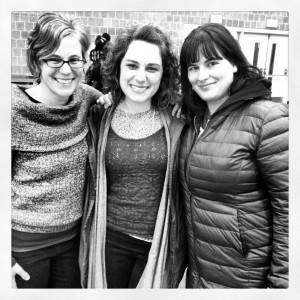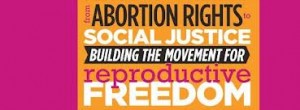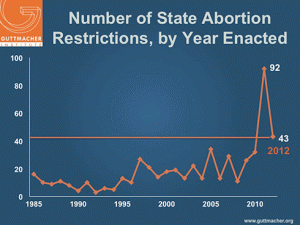By Sarah Meharg, MSW Catholic University of America Class of 2013
Catholic University of America’s (CUA) National Catholic School of Social Service (NCSSS) has long been a well-respected social work program, with the Gourman Report placing it in the top 11%. Its web site states: “Our commitment to supporting traditional social work values while responding to today’s educational and practice developments continues to make ours a highly regarded program both within the academic world and the practice community.”
Despite this statement, NCSSS’s new dean, Will C. Rainford, LMSW, Ph.D. announced in October that the school was severing ties with the National Association of Social Workers (NASW), the largest membership organization of social workers in America, basing his decision on what he referred to on Twitter as an “overt public policy position that social workers should advocate for access to abortion.” A Google search for NASW + abortion brought up two hits; arguably a less than overt position. The announcement was made without either informing/meeting with students and/or alumni to discuss the implications of this step. Confusion regarding concerns such as accreditation has inevitably ensued.
It is unclear what prompted this action since NASW issued their Family Planning and Reproductive Health policy statement in 2006: “Self-determination means that without government interference, people can make their own decisions about sexuality and reproduction. It requires working toward safe, legal, and accessible reproductive health care services, including abortion services, for everyone.”
The press release on NCSSS’s web site boasts that its newest Dean was NASW-Idaho Social Worker of the Year with his CV adding that he also served as a member of the same chapter’s Legislative Advocacy Committee between 2005 and 2007. Given Dean Rainford’s previous affiliation with NASW it is hard to believe that he was not previously familiar with the 2006 policy statement, making his stated motivation for NCSSS’s resignation from the organization questionable.
Dr. Frederick Reamer, a highly respected professor of ethics at NCSSS, wrote in Social Work Values and Ethics that NASW is not a pro-abortion organization; rather it is a pro-choice organization (2006). The NASW Code of Ethics does not directly address abortion; rather it states that social workers have an obligation to foster self-determination. However, Reamer writes that the Code of Ethics does state that social workers should refer clients to other professionals when they are not able to provide assistance or be effective.
It is difficult to understate the significance of this membership organization and the state chapters within the social work profession. The NASW Code of Ethics, sacred to the practice of social work, is integrated into educational curriculums. It helps practitioners learn the difference between right and wrong as well as to help them apply that understanding. NASW adjudicates when social workers violate this code and applies sanctions when necessary. Although state licensing boards do not require membership in NASW, they do require adherence to the NASW Code of Ethics. An education that excludes this code clearly puts future practitioners at a disadvantage.
NASW also accredits CEUs; an annual necessity for licensed social workers. NCSSS itself offers CEU workshops throughout the year and it is unclear what impact no longer being affiliated with NASW will have on these continued education opportunities. Discounted CEU workshops have also traditionally acted as an incentive for field instructors to take on students in field placements and if discontinued may impact the field placements NCSSS is able offer.
To understand the motivation behind seceding, the school of social work must be placed within the context of CUA as a whole. CUA isn’t the average regularly religiously affiliated school, it is a pontifical university established and approved by the Holy See and governed by the Pope. It was established in 1889 with the mission of the instruction of Catholicism and human nature with the goal of furthering strengthening the Church via scientific and humanistic research as informed by the Catholic faith. Since 1889, tremendous advances have been made in science contributing to mankind’s understanding of both reproduction and the prevention of disease including the scourge of HIV/AIDS. The intrinsic humanistic benefits of this progress have been ignored by a Church still dwelling in an era with a primarily agrarian economy and high infant mortality rates.
With this decision, Dean Rainford has shown not only poor judgment but poor timing as well. Pope Francis has reinvigorated many who felt the Catholic Church was no longer relevant, recently writing that the church has grown “obsessed” with abortion, gay marriage and contraception, putting dogma before love. Although remaining anti-choice, Pope Francis has conceded that the church has done little to help women who were in need of it. However, the Vatican also recently distributed a survey designed to assess the difficulty of practicing the church’s preachings in a modern world, asking Catholics about their use of contraceptives, feelings on homosexuality, and divorce. This is remarkably progressive for the church and while it has taken a step forward, NCSSS has simultaneously taken a large one back.
Dean Rainford has also potentially tarnished the high regard in which the program has been held by assigning it more of a religious mission and less of a social service one. Religious schools are not legally required to be accredited. Lack of accreditation has typically been associated with schools that award degrees with little to no coursework to any “student” who can pay the price. Should NCSSS slide down this path, it is sure to devalue the substantial financial investment associated with getting a Master’s degree.
The process of NCSSS’s resignation from NASW can be seen as a metaphor for the arguments over reproductive rights. Those who hold the power (the administration at NCSSS), have made an important decision on behalf of those do not (the student body). Self-determination, so prioritized in this field, has been ignored by the administration at NCSSS. As Dr. Reamer wrote, if a practitioner is unable to assist a client, they should make an appropriate referral and excuse themselves.






